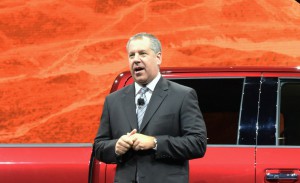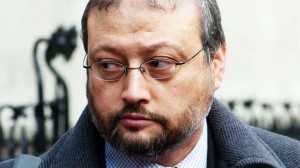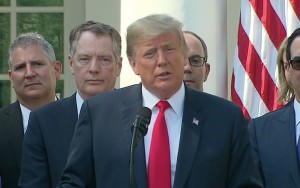
Joe Hinrichs, Ford president, said that the volatility of the Middle East, specifically Saudi Arabia, impacts automakers.
Car makers from around the world will pause briefly during the next couple of weeks to unveil their financial statements for the July-September quarter, which, on balance, was relatively calm despite rising pressure on their margins from Chinese and American tariffs.
However, VW CEO Herbert Diess did warn the stress on manufacturers is growing steadily. German carmakers only have a 50% chance of surviving reforms required to shift production to electric cars and to tackle new geopolitical threats push some carmakers out of business, he said.
Meanwhile, the pressure from tariffs is liable to get more intense in the future. The Trump administration is continuing to threaten tariff on auto exported from Japan. Meanwhile, the unsettling news cycle from the Middle East that began with the kidnapping and murder of Jamal Khashoggi continues to unfold with uncertain consequences.
Joe Hinrichs, who as Ford Motor Co.’s executive vice president for global operations is one of the industry most senior executives, acknowledged this week that the tariffs have driven up the company’s cost because American-made steel is the “most expensive” in the world. But expensive steel is only one of the company’s problems.
Hinrichs also said he is paying close attention to the events unfolding in Saudi Arabia, where the government has already confessed Khashoggi’s murder. “We’re always interested in what the geo-political environment. It effects our industry very significantly. We’re watching it because it can effect oil, it can effect trade and it can effect stability in the market,” Hinrichs told reporters this week.

Journalist Jamal Khashoggi was allegedly murdered by two Saudi hit teams inside the country's consulate in Turkey.
(Hackett says Ford making headway on turnaround. Click Here for the story.)
Almost on cue the Dow Jones Average plunged more than 500 points before stabilizing with a 126-point drop for the day, partly on what analysts described as concerns around Saudi Arabia. Meanwhile, the Saudi’s moved to shore up their public image by vowing to maintain oil production at a high level, which cut the price of oil on world market.
Nonetheless, well-informed observers are suggested that the crisis surrounding Saudi Arabia isn’t over.
“Despite talk of reform, foreign direct invest inflows into Saudi have stayed low and the scandal will only increase investor uncertainty,” said research firm Capital Economics as the Saudis launched their economics conference this week.
Carl Pope, a former president of the Sierra Club, who has argued for years that the world’s automakers need to wean themselves from oil with electric vehicles, wrote this week that “Even if we slide through this time, the pattern is clear – a world which cannot survive even a temporary disruption of Saudi Arabia’s desire or capacity to pump 10 million barrels of oil every day is a world at risk.”
If Crown Prince Mohammed bin Salman weathers the storm, but the U.S. levies strong sanctions against the Saudi kingdom, will he retaliate by cutting his oil production, spiking prices and accelerating the heavy burden oil is already putting on global prosperity?
(Click Here for more about U.S. auto sales.)

President Donald Trump's response to the Saudis involvement in the death of Khashoggi may impact the U.S. economy.
Pope, one of the architects of California’s Clean Air Standards and a frequent critic of the global auto industry, wrote if there are no sanctions, and the prince feels empowered to continue cracking down on dissent and diversity, how long is it before the restless Shiites of eastern Saudi Arabia rise in potentially explosive disturbances right in the heart of the kingdom’s oil fields? “If there are sanctions, and their impact is to weaken MBS, who fills the gap in leadership? ” he added.
Other analysts also have expressed concerns about the Saudi Arabia economic and political stability, which is closely tied to the global auto industry with its dependence on the oil-burning internal combustion engine.
“The world can do without Saudi oil – but only once it gets serious about electrifying transportation. The risk of Saudi instability should drive policymakers forward,” Pope argued.
Longer term, if we do slide past the current rapids, there is a solution, Pope said.
“Embracing the rapid electrification of transportation, and replacing oil still used in the power sector, will slash both dependence on oil and the price paid for the crude we still use. The difference between the ambitious 20% share of vehicle miles that ABI expects to be electrified by 2030 and the modest 3% that OPEC recently forecast is a demand drop of 7.5 million barrels a day, equivalent to three-quarters of Saudi Arabia’s entire production,” Pope added.
(To see more about how falling sales in China complicates U.S. strategy, Click Here.)
“It’s heartening and symbolic that only a few days after Khashoggi’s brutal murder, the European Union, over vigorous opposition from EU automakers, voted to require a 35%reduction in oil consumption by trucks, only a week after setting a similar high bar for light-duty vehicles,” said Pope.
